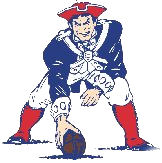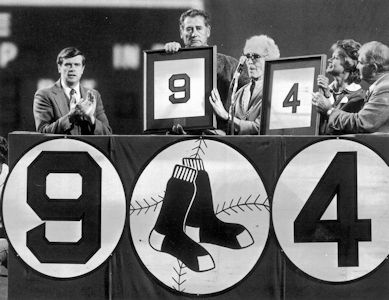 |
|
 |
||||||||||
 |
|
Ted Williams and Joe Cronin have their numbers retired |
ON THIS DATE (May, 28, 1984) ... Ted stood up at the ceremony and played it as if he were accepting the Republican nomination or receiving the National Merit of Honor; or as if it were 1946 or 1967 or 1978 again. “You people who came out here tonight after all the rain really showed me something,” he boomed enthusiastically as he finished his speech. “As far as I’m concerned, baseball’s the greatest, Boston has the greatest fans and I salute you,” and, with that, got into the cart and was chauffeured around Fenway. “A real hitter’s manager,” Ted wrote of Cronin in “My Turn at Bat.” He recalled, fondly, how Cronin had helped him grow up, how Cronin told him, “Hey, kid, how about practicing more of this and a little less of that?” while waving an imaginary bat, and how he “jerked me out of a game for loafing . . . He was a big, good-looking Irishman who could swoon you. He could suave writers to death.” Ted called Cronin “the biggest part of the night,” and as the former superstar shortstop, manager, general manager and American League president beamed down from a box above the third base stands, Williams remembered him. “One of the great breaks I had in this game was that I got to play for a manager like Joe,” Ted told the audience. Later, he told reporters that “Joe would always have some little blip before a game to get you thinking about the pitcher and the situation.” “Joe was both the manager and the shortstop when I broke in,” Bobby Doerr recalled. “He’d slowed down a little, but he really helped me. He was smart, extremely smart, and, you know, I never saw him make a bad throw. But the thing I remember about Joe was that he was as good a hitter as I ever saw with a runner on second and two out. He might have been the greatest clutch hitter who ever lived.” Charlie Wagner seconded that memory, then added his memory of Cronin the manager. “Never,” said Wagner, “did the man ever second-guess anyone.” After Doerr presented the Thomas A. Yawkey Award to Cronin, Ted recalled that when he was a skinny benchwarmer in San Diego and was discovered by Eddie Collins, it was Doerr that Collins was out to see. Then, what it meant to be in Boston from 1939 to 1960, until the final home run off Jack Fisher. “They can’t ever say that I didn’t give 100 percent,” said Williams. Cronin came into the press room to offer his respect for Ted and tell of how “he could do anything he wanted - take apart a camera, be the best bone fisherman in Florida . . . I’m the one who’s lucky to have been associated with Ted Williams.” |
